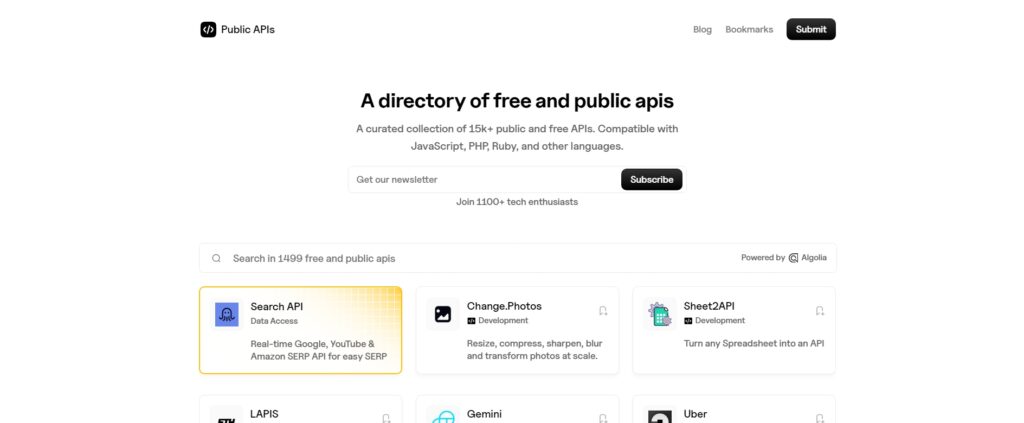In recent years, the proliferation of public APIs has transformed the landscape of software development, enabling developers to access a wide array of functionalities without extensive overhead. Public APIs, or application programming interfaces, serve as bridges between different software systems, allowing them to communicate and share data seamlessly. These APIs play a vital role in enhancing websites, applications, web apps, and bots by allowing developers to leverage pre-existing services and data sources, thus accelerating development timelines and reducing redundancy.

One significant barrier that developers often face is the requirement for authentication tokens, which can complicate access and limit API usage. Many public APIs impose restrictions in their free plans, requiring users to obtain an authorization token to unlock their functionalities. This can deter developers, particularly those working on small projects or prototypes, from fully utilizing the power of these interfaces. Consequently, the availability of unrestricted public APIs becomes invaluable for developers seeking to integrate services without these cumbersome requirements.
These unrestricted APIs supply a diverse range of functionalities, including data retrieval, processing, and integration with popular platforms and services. The absence of authorization tokens not only simplifies the integration process but also encourages experimentation and innovation. By utilizing free public APIs that do not require authentication, developers can swiftly prototype their ideas and engage in creative endeavors without being hindered by bureaucratic hurdles. Such APIs can be particularly beneficial for hobbyists, startups, or educational projects, where resource constraints are often a significant concern.
In the upcoming sections, we will explore the top ten free public APIs available, highlighting their unique capabilities and how they can effectively support your development projects.
Top 10 Free Public APIs
APIs have become a crucial component in the development of modern applications, allowing seamless integration of varying functionalities. Below, we explore ten notable free public APIs available for developers, which do not require authorization tokens, making them easy and convenient to use in projects.
1. Bored API
This API generates random activities for users who feel bored and need some inspiration. By providing the user with diverse options like reading a book, going for a walk, or trying a new hobby, developers can enhance user engagement in their applications.
Here’s a sample request to:
https://apis.scrimba.com/bored/api/activityHere’s the sample response:
{
"activity": "Bake something you've never tried before",
"type": "cooking",
"participants": 1,
"price": 0.4,
"link": "",
"key": "5665663",
"accessibility": 0.3
}2. Public APIs API
An API that serves as an aggregator for other public APIs. It lists various free APIs categorized by subject (health, science, games, etc.), allowing developers to discover additional resources swiftly.
This has a huge list of public free APIs:

3. RandomUser API
A tool designed to generate random user data, which can be beneficial for mock applications and testing. This API produces generic user profiles, including name, address, and email, useful for presenting realistic user interfaces.
Here’s a sample request to:
https://randomuser.me/api/Here’s the sample response:
"results": [
{
"gender": "male",
"name": {
"title": "Mr",
"first": "Kolodar",
"last": "Lavrenchuk"
},
"location": {
"street": {
"number": 1791,
"name": "Vadima Boyka"
},
"city": "Kamin-Kashirskiy",
"state": "Luganska",
"country": "Ukraine",
"postcode": 12683,
"coordinates": {
"latitude": "77.7075",
"longitude": "-22.3918"
},
"timezone": {
"offset": "-5:00",
"description": "Eastern Time (US & Canada), Bogota, Lima"
}
},
"email": "[email protected]",
"login": {
"uuid": "77321670-4f1b-4f68-a662-511b7297f96e",
"username": "happydog416",
"password": "hall",
"salt": "q7hR8zHP",
"md5": "d956ecf32c95a85db677cd4631e3c2ce",
"sha1": "f9d6cf51180c10bd088c1d9e3ca71633ace47e00",
"sha256": "3a15d1cebaa298f88ab0aaac4420be72935ab300e51171dca0443c2aee381b25"
},
"dob": {
"date": "1948-06-30T02:15:52.805Z",
"age": 76
},
"registered": {
"date": "2003-08-07T23:24:19.767Z",
"age": 21
},
"phone": "(096) E64-9548",
"cell": "(096) M07-0434",
"id": {
"name": "",
"value": null
},
"picture": {
"large": "https://randomuser.me/api/portraits/men/74.jpg",
"medium": "https://randomuser.me/api/portraits/med/men/74.jpg",
"thumbnail": "https://randomuser.me/api/portraits/thumb/men/74.jpg"
},
"nat": "UA"
}
],
"info": {
"seed": "f6772d2318a30dbe",
"results": 1,
"page": 1,
"version": "1.4"
}
}4. Agify.io API
This API estimates a person’s age based on their first name. Developers can incorporate it into social media and marketing platforms to analyze demographic trends related to names, enhancing targeted content delivery.
Here’s a sample request to:
https://api.agify.io/?name=alvinHere’s the sample response:
{
"count": 9518,
"name": "alvin",
"age": 69
}5. Genderize.io API
Similar to Agify, this API predicts a user’s gender based on their name. It is valuable for applications that require gender classification or demographic analysis during user registration.
Here’s a sample request to:
https://api.genderize.io/?name=parkerHere’s the sample response:
{
"count": 6354,
"name": "parker",
"gender": "male",
"probability": 0.91
}6. Nationalize.io API
This API predicts a person’s nationality based on their first name. It can be utilized in applications that cater to international audiences, aiding personalization strategies.
Here’s a sample request to:
https://api.nationalize.io/?name=michaelHere’s the sample response:
{
"count": 129385,
"name": "michael",
"country": [
{
"country_id": "NG",
"probability": 0.08072891893012198
},
{
"country_id": "CY",
"probability": 0.07509944218012053
},
{
"country_id": "GH",
"probability": 0.05387078281978828
},
{
"country_id": "CN",
"probability": 0.03992310598585022
},
{
"country_id": "US",
"probability": 0.03816919836588408
}
]
}7. Zippopotam API
A useful API for retrieving location information based on postal codes. This can be integrated into e-commerce websites to assist in shipping processes and enhance the user experience.
Here’s a sample request to:
http://api.zippopotam.us/us/90210Here’s the sample response:
{
"post code": "90210",
"country": "United States",
"country abbreviation": "US",
"places": [
{
"place name": "Beverly Hills",
"longitude": "-118.4065",
"state": "California",
"state abbreviation": "CA",
"latitude": "34.0901"
}
]
}8. Universities List API
This API provides lists of universities by country. It is instrumental for educational platforms, aiding students in finding relevant information about universities worldwide.
Here’s a sample request to:
http://universities.hipolabs.com/search?country=United+StatesHere’s the sample response:
[
{
"web_pages": [
"http://www.marywood.edu"
],
"alpha_two_code": "US",
"state-province": null,
"domains": [
"marywood.edu"
],
"country": "United States",
"name": "Marywood University"
},
{
"web_pages": [
"http://www.lindenwood.edu/"
],
"alpha_two_code": "US",
"state-province": null,
"domains": [
"lindenwood.edu"
],
"country": "United States",
"name": "Lindenwood University"
},
...
]9. Ipify API
A simple API that returns the user’s IP address. It can be utilized in various applications, particularly in web services that need to identify user locations without complex setups.
Here’s a sample request to:
https://api.ipify.org/?format=jsonHere’s the sample response:
{
"ip": "100.100.200.20"
}10. Ipinfo API
This API provides detailed information about IP addresses, such as location and ISP. Developers can leverage this in analytics to enhance user engagement by personalizing experiences based on geolocation.
Here’s a sample request to:
https://ipinfo.io/161.185.160.93/geoHere’s a sample response:
{
"ip": "161.185.160.93",
"city": "New York City",
"region": "New York",
"country": "US",
"loc": "40.7143,-74.0060",
"org": "AS22252 The City of New York",
"postal": "10001",
"timezone": "America/New_York",
"readme": "https://ipinfo.io/missingauth"
}These APIs demonstrate the significant potential of public APIs in enriching applications. Developers can seamlessly integrate these tools into their projects to achieve enhanced functionality without the need for complex authentication processes.
Bonus Free APIs to Explore
In addition to the primary selection of free public APIs that do not necessitate authentication tokens, there exists a variety of other options that developers and enthusiasts may find engaging. These APIs not only provide valuable data but also serve as a source of inspiration for innovative projects. Here, we explore a few noteworthy alternatives that can enhance your API integration experience.
First on the list is the Cat Facts API. This amusing service offers a plethora of interesting feline-related facts, which can be ideal for lighthearted applications, social media tools, or even chatbots. By integrating the Cat Facts API, developers can easily inject a bit of fun into their projects, appealing to cat lovers and trivia buffs alike.
Next, the Coindesk API provides real-time data surrounding cryptocurrency prices and trends. This public API delivers valuable information regarding Bitcoin and other cryptocurrencies, allowing developers to build financial dashboards, market analysis tools, or access historical data for research purposes. The ease of use associated with the Coindesk API makes it an attractive choice for those interested in digital currency and blockchain technology.
Another available option is the DataUSA API. This API serves an abundance of publicly available U.S. government data, encompassing demographics, economics, and education statistics. Developers can utilize this resource to create informative applications aimed at delivering insights into societal patterns and trends. With its rich dataset, the DataUSA API provides opportunities for data visualization and civic engagement.
Lastly, the Dogs API caters to dog enthusiasts by offering images, breed information, and more concerning various dog breeds. This API can be integrated into mobile applications, websites, and games, allowing users to fetch random dog pictures or discover details about their favorite breeds. The ability to easily access this fun content can keep users engaged while providing an entertaining experience.
There is a vast landscape of free public APIs available for exploration. By experimenting with these platforms, developers can unlock potential project ideas and foster creativity without the burden of authentication. By leveraging these resources, it is possible to create unique applications that entertain, inform, and inspire.
Conclusion and Best Practices
Utilizing free public APIs that do not require authentication tokens presents numerous benefits for developers and organizations looking to streamline their projects. These APIs make it easier to access data or services without the added complexity of managing authentication processes. As a result, developers can focus on building scalable applications without the burden of registering for token access or navigating subscription models.
One of the key advantages of employing free public APIs is the ease of integration. Developers can quickly prototype and develop applications using available endpoints, allowing for enhanced agility in the development process. These APIs often cover a broad range of use cases, from weather data to financial market information, enabling developers to enrich their applications with valuable information with minimal overhead. Furthermore, the accessibility of these APIs fosters innovation and experimentation, making it possible to iterate on ideas without substantial financial risk.
However, to maximize the effectiveness of these public APIs, developers should adhere to best practices when integrating and utilizing them within their projects. One essential practice is proper error handling; developers should anticipate potential issues such as rate limiting or incorrect data responses and implement logic to gracefully manage these scenarios. Additionally, validating the data received from APIs is paramount, as this ensures that only accurate and relevant information is processed within the application.
Additionally, performance optimization is crucial while working with public APIs. Minimizing network requests, caching responses where feasible, and considering fallbacks in case of service instability can substantially enhance user experience. By adhering to these best practices, developers can confidently leverage the power of free public APIs, enriching their applications while navigating the associated challenges effectively.



